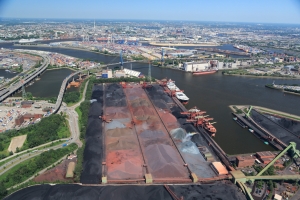


(Posted on 17/11/23)
The Central Association of German Seaport Operators (ZDS) has called for a decisive German port policy. The global crises and their economic effects are having a negative impact on the current handling business. At the same time, the port industry has major transformation tasks to master.
The difficult economic situation, inflation and geopolitical crises are having a direct impact on throughput in the ports. Handling volumes in German seaports fell to a similar extent as in other European countries. Energy imports increased significantly as a result of the sanctions imposed on Russia.
Angela Titzrath, President of the ZDS: "The port industry is hugely important for the country. From a national perspective, it is a key pillar of the German industrial and export economy. Falling consumer demand and the resulting decline in industrial production is often first seen in the seaports. A look at the seaports in our neighboring countries shows that we are primarily dealing with global problems here. Nevertheless, this phase of economic weakness is hitting our industry at an inopportune time. We have to master important transformation processes, especially in terms of digitalization and automation as well as the switch to climate-friendly drives. We are facing an important phase in the aforementioned transformation processes, but also in new tasks for the ports, especially in terms of energy supply."
The German port industry has high expectations of the German government's upcoming National Ports Strategy.
ZDS President Titzrath: "At the National Maritime Conference, the Chancellor made it clear how important the seaports in particular are and that they have been politically neglected in recent years. The Vice-Chancellor emphasized the importance of ports in achieving climate protection targets and expanding renewable energies. The National Ports Strategy must be measured against this. However, the debate surrounding the financing of seaports is telling. The federal government must stand by its responsibility - as announced in the coalition agreement and at the conference. To this end, a rapid agreement on port load balancing is essential. If this minimum target is not achieved, it is hard to imagine how a national port strategy can meet expectations."
According to the ZDS, there is also a great need for action regarding the role of ports in the energy transition.
ZDS President Angela Titzrath: "There is a lack of handling capacity in Germany's ports to achieve the expansion targets for wind energy. The turbines and components have become larger and heavier, but the port areas have not grown with them. We therefore propose using the enormous proceeds from the tendering of offshore wind farms to expand suitable areas."
The German port industry also sees a need for action in terms of transport infrastructure.
ZDS President Angela Titzrath: "The decades-long and, in some cases, continuing underfunding is making itself felt in all modes of transport. We expect adequate staffing and funding in order to keep the transport routes in good condition. However, there is also a need for expansion, especially for the railroads, which are expected to take on more goods from the roads. For us as seaport operators, the focus here is on the bottleneck between Hamburg and Hanover. All parties involved should urgently agree on a compromise on a four-track system in line with the overarching expansion goals. A further delay or even an insistence on the outdated minimum consensus of a three-track system will cause lasting damage to the German port industry."
The Port of Trois-Rivières has awarded the title of the first vessel of the year to VECTIS PRIDE... Read more
The New Lock in Terneuzen has been operational since 1 August 2025 and a new phase has now begun: On... Read more
Two modern warehouses belonging to Solid Port, one of the key operators in the Inner Port, have been... Read more
With this year’s Rail Conference “Rail Freight Transport and Seaports”, a joint initiative... Read more
Asian Bulk Logistics (ABL Group) and ICG have jointly announced the successful completion of ABL&rsquo... Read more
Abu Dhabi based AD Ports Group, a leading global enabler of integrated trade, industry and logistics... Read more
The Executive Board of Hamburger Hafen und Logistik AG (HHLA) has appointed Patrick Krawutschke as Managing... Read more
Abu Dhabi based AD Ports Group, a global enabler of integrated trade, transport, industry, and logistics... Read more
This year marks a significant milestone in maritime innovation as Port Hedland, Australia, celebrates... Read more
Associated British Ports (ABP), the UK’s leading port operator, has announced the latest tranche... Read more